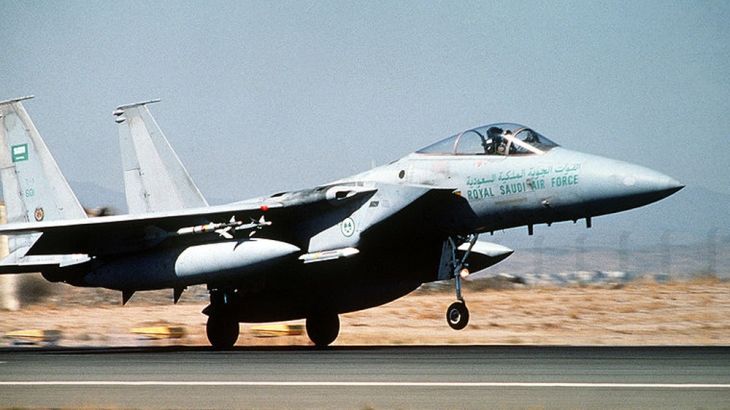Many dead in ‘airstrike on refugee camp’ in north Yemen
At least 40 dead amid conflicting reports on whether camp in Hajjah was housing displaced people or Houthi fighters.

At least 40 people have been killed in an attack on a camp for internally displaced people in north Yemen, as a Saudi-led coalition continued to strike Houthi targets around the country for a fifth day.
Several sources said an air strike on Monday struck the Al-Mazraq camp in the northwestern province of Hajjah, close to the Saudi border, but Yemen’s foreign minister, Riyadh Yasin, insisted it was caused by Houthi artillery fire.
Keep reading
list of 4 itemsUS sanctions shipping firm accused of links to Iran, Yemen’s Houthis
Vessel struck in Red Sea as Houthis promise attacks on more shipping lanes
What we know about deadly Houthi attack on cargo ship
Pablo Marco, the manager of the Doctors Without Borders (MSF) programme in the Middle East said: “It was an air strike,” adding that dozens of Yemenis were injured.
|
|
“People in Al-Mazraq camp have been living in very harsh conditions since 2009, and now they have suffered the consequences of an airstrike.”
Houthi-run al–Masirah TV showed blurred footage from the aftermath of the attack purporting to show the bodies of the victims.
Whilst UNHCR spokesperson Babar Baloch confirmed the attack, he told Al Jazeera it was unclear what caused the deaths.
“We are not able to confirm how the attack happened, but remain concerned for the safety and security of the displaced,” Baloch said.
Meanwhile, witnesses told the AP news agency that while the camp used to house people displaced by an earlier conflict that ended five years ago, it was now occupied by Houthi forces and that most of those killed were fighters.
When asked about the allegations, Brigadier General Ahmed al-Asiri, a spokesman for the Arab coalition, said the kingdom was seeking clarification on the incident.
“It could have been that the fighter jets replied to fire, and we cannot confirm that it was a refugee camp,” Asiri said.
“We will ask the Yemeni official agencies to confirm that,” he told reporters.
It was not immediately possible to resolve the conflicting accounts.
Al Jazeera’s Hashem Ahelbarra, who has reported extensively from Yemen, said thousands of displaced Yemenis had been living at camps such as Al-Mazraq since 2004, after being driven from their homes by an offensive launched by former President Ali Abdullah Saleh against the Houthis.
Elsewhere, Saudi-led air strikes continued to target Houthi-held areas on Monday night – the sixth successive night of coalition’s aerial campaign. Video footage showed large explosions as air strikes hit at an ammunition depot in Sanaa.
Air strikes also targeted the camp of the 131 Infantry Brigade in Saada and Houthi positions in the cities of Taiz and Hodeidah.
Blockade imposed
In another development, Saudi-led naval forces imposed a blockade on the country’s ports to prevent the Houthis from rearming.
Brigadier al–Asiri said on Monday that naval forces were blocking the movement of ships to prevent weapons and fighters from entering or leaving Yemen.
The shut down has affected the major seaports at Aden and Hodeidah.
The city of Hodeidah is vital to the economy with its strategic location north of the Bab el-Mandeb strait, which is used to ship most of Yemen’s oil to international markets.
ANALYSIS FROM OUR CORRESPONDENT

The US Energy Information Administration (EIA) estimates that 3.8 million barrels-per-day passed through Bab el-Mandeb in 2013 – making it the fourth-largest waterway after the Strait of Hormuz, between the United Arab Emirates and Iran; the Strait of Malacca, between Malaysia and Indonesia; and Egypt’s Suez Canal between the Red Sea and the Mediterranean.
Bab Al-Mandeb means ‘Gate of Tears’ in Arabic, a name earned in ancient times because of the difficulties vessels have had safely navigating the strait due to the natural formations that reside in many places just under water level.
The Strait is heavily guarded.
This, because of persistent attempts by Somali pirates to hijack oil tankers and hold them for ransom. In 2008, pirates seized Saudi Arabia’s MV Sirius Star Supertanker and held it for months before a $3m ransom was paid.
Navies from Russia, Ukraine, India, the US, Britain and France routinely patrol the waters.
Most of these forces have bases in the tiny horn of African Country of Djibouti.
Last week, Egypt deployed four of its vessels Yemen to secure the waters around the port city of Aden where a chinese warship reportedly docked to help Chinese citizens evacuate the area.
Most of expatriates in Yemen including UN and aid workers have been evacuated to nearby Djibouti. Following the closure of Yemen’s three ports of Aden, Mukallah and Hodeida maritime traffic destined for these ports have also been diverted to Djibouti.
At least a dozen oil tankers and container ships heading to the Yemeni ports arrived in Djibouti since Wednesday last week.